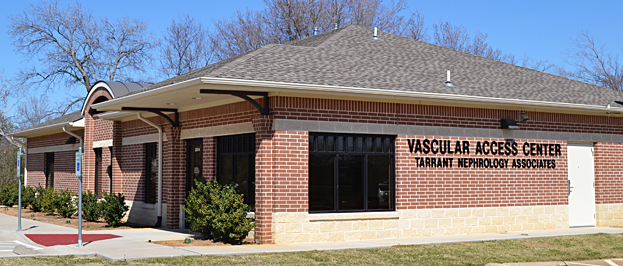Our Services

Vascular Access Services
Tarrant Vascular Access Centers are dedicated to caring and maintaining your dialysis access. Patients on dialysis understand the importance of blood to be easily taken from an access point. At local Vascular Access Centers, Interventional Nephrologist perform outpatient procedures to protect and increase access performance. The ideal hemodialysis access is an artery to vein shunt that delivers high blood flow, easy insertion of needle into fistula/graft for dialysis. Most causes of failure of a fistula or graft are narrowing of the blood vessel. With constant supervision we may be able to keep the access open and working longer.
Learn more by visiting: Tarrant Vascular Access Centers.
Reasons to have your access checked are:
- Poor blood flow (a measure of the adequacy of a dialysis treatment)
- Poor KT/V (adequacy of dialysis)
- Difficulty cannulating (insertion of needle into fistula/graft for dialysis)
- High venous pressures
- Excessive bleeding after dialysis
- Failure of a fistula to mature
- Decrease access blood flow by indirect measurements
If you or a family member is experiencing any of these symptoms you may qualify for a simple outpatient procedure.
Outpatient Procedures Provided
Angiograms of dialysis fistula or graft
This is a minimally invasive procedure using contrast (IR) and fluoroscopy (x-ray) to better assess the patency of dialysis shunt.. If a stenosis (blockage) is found it can be corrected with angioplasty (a balloon procedure to relieve the blockage)
Thrombectomy (Declot)
A minimally invasive procedure to remove clots from a dialysis shunt
Hemodialysis Catheter Placement / Exchange / and Removal
Vein Mapping
A minimally invasive procedure that helps a vascular access surgeon identify the most suitable veins for a dialysis shunt

